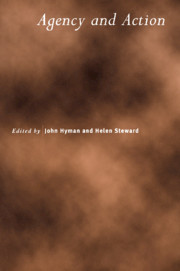Book contents
- Frontmatter
- Contents
- Preface
- Notes on Contributors
- Agency and Actions
- Two Ways of Explaining Actions
- Anscombe on ‘Practical Knowledge’
- Action, the Act Requirement and Criminal Liability
- Emotion, Cognition and Action
- Kantian Autonomy
- The Structure of Orthonomy
- Normativity and the Will
- Can Libertarians Make Promises?
- Intention as Faith
- The Destruction of the World Trade Center and the Law on Event-identity
Action, the Act Requirement and Criminal Liability
Published online by Cambridge University Press: 07 September 2010
- Frontmatter
- Contents
- Preface
- Notes on Contributors
- Agency and Actions
- Two Ways of Explaining Actions
- Anscombe on ‘Practical Knowledge’
- Action, the Act Requirement and Criminal Liability
- Emotion, Cognition and Action
- Kantian Autonomy
- The Structure of Orthonomy
- Normativity and the Will
- Can Libertarians Make Promises?
- Intention as Faith
- The Destruction of the World Trade Center and the Law on Event-identity
Summary
The ‘Act Requirement’ in Criminal Law
The slogan that criminal liability requires an ‘act’, or a ‘voluntary act’, is still something of a commonplace in textbooks of criminal law. There are, it is usually added, certain exceptions to this requirement—cases in which liability is in fact, and perhaps even properly, imposed in the absence of such an act: but the ‘act requirement’ is taken to represent a normally minimal necessary condition of criminal liability. Even offences of strict liability, for which no mens rea is required, require an act: thus to the familiar slogan that actus non facit reum nisi mens sit rea we can add the prior, more fundamental slogan that mens non facit reum nisi actus sit reus; before we ask whether a defendant acted with mens rea or fault, we must ask whether he committed a criminal act at all.
Two initial points should be noted about the act requirement as it is standardly conceived among criminal law theorists.
First, the requirement might be expressed in terms of ‘an act’, or of ‘a voluntary act’. The reference to voluntariness, however, is not to a further requirement, beyond that of an act: it rather makes explicit what is taken to be implicit in the very notion of an ‘act’ in this context. It is as responsible agents that we are held criminally liable, and only our voluntary, i.e. non-involuntary, behaviour can contribute to our responsible agency.
Second, the act requirement serves both a descriptive and a normative role in criminal law theorizing.
- Type
- Chapter
- Information
- Agency and Action , pp. 69 - 104Publisher: Cambridge University PressPrint publication year: 2004
- 3
- Cited by

